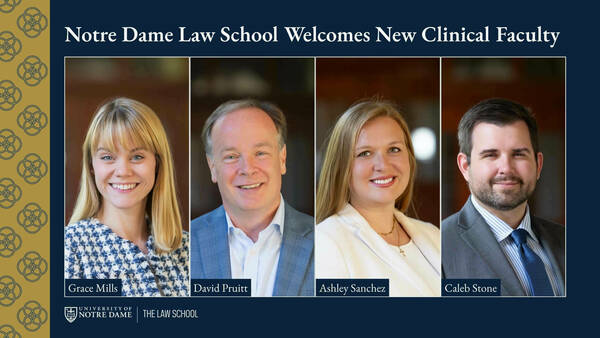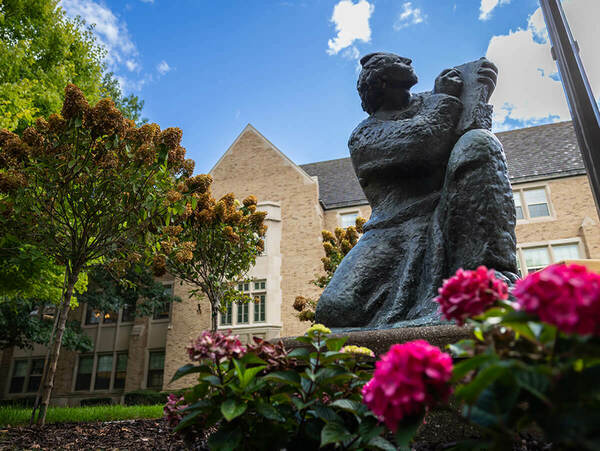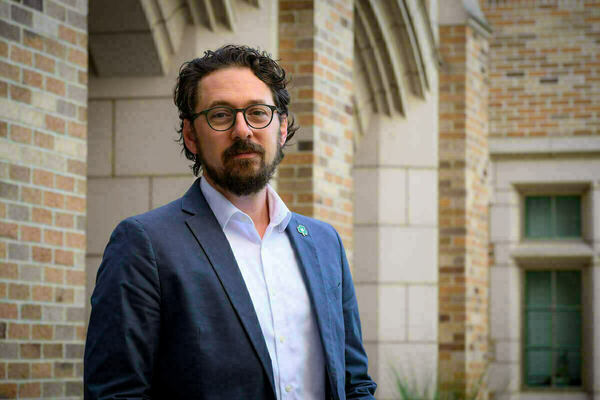Notre Dame researchers to shed light on the Brazilian Amazon, conflict resolution, microplastics, and more
Notre Dame Research (NDR) has selected five awardees of the Research and Scholarship Program – Regular Grant (RSP-RG) and five awardees of the Research and Scholarship Program — Initiation Grant (RSP-IG).
A competitive internal funding opportunity, the RSP-RG supports outstanding research, scholarship, or creative endeavors that will make a major contribution in any field of study and advance the University’s mission to advance the common good. It provides support for a new standalone project or a major advancement connected to established research. The RSP-IG provides seed funds to early career faculty beginning their research programs, or to established faculty initiating new research, scholarship, or creative projects.
“Notre Dame Research is proud to support this remarkable collection of innovative and wide-ranging projects,” said Jeffrey F. Rhoads, John and Catherine Martin Family Vice President for Research and professor in the Department of Aerospace and Mechanical Engineering. “Collectively, these research initiatives reflect and advance the University’s mission to pursue knowledge in service of the common good.”
The following five projects received RSP-RG funding in this cycle:
Learning from the boycotts of the past
Ashley Bohrer, assistant professor of gender and peace studies at the Kroc Institute for International Peace Studies at the Keough School of Global Affairs, has received support for a book project titled "We Don't Buy It: A Global Study of Boycott in Theory and Practice.” Bohrer, who is also a concurrent faculty member in the Gender Studies Program, will conduct archival research to construct a comprehensive history of the theory and outcomes of boycott movements around the world. As boycotts and protests become more common globally, Bohrer’s project will look to the past to inform consumer decision-making in the present.
Measuring teacher well-being in humanitarian emergencies
Nikhit D’Sa, assistant research professor and director for research at the Global Center for the Development of the Whole Child in the Institute for Educational Initiatives, will collaborate with partners located in humanitarian emergencies–such as situations of conflict, communal violence, or political upheaval–to compile a longitudinal dataset on the status of teachers working in these emergencies, a cohort for which very limited reliable data exists. Their project, titled “Wellbeing of Teachers in Emergencies: Unpacking the Antecedents of Retention and Burnout,” seeks to understand what factors predict the well-being of teachers and how this affects their decision to stay in the profession. Using an assessment that D'Sa developed alongside teachers in Uganda, the team will measure the occupational well-being of 3,000 teachers across five countries. Their findings will be used to influence national policies concerning teacher certification, training, support, and retention.
Investigating activist polarization in the American electorate
Geoffrey Layman, professor and chair of the Department of Political Science, will pursue a book project titled “Breaking up the Parties: Activists and the Polarization of American Politics.” Layman, who is also affiliated with the Rooney Center for the Study of American Democracy, will explore the role of party activists as catalysts for polarization between Democrats and Republicans and the broader impact these activists have on American democracy. Layman is especially interested in the extent to which activist polarization spurs polarization in the general public. The study includes a survey of delegates to the 2024 Democratic and Republican national conventions as well as a survey of grassroots-level political activists. It also will make use of national convention delegate surveys that Layman and his colleagues have conducted since 2000 and of convention delegate surveys conducted by other scholars from 1972 to 1992.
Documenting how song influenced revolutionary politics
Ian Newman, associate professor in the Department of English, has received support for a project titled “Political Song, 1750-1850.” Newman will conduct archival research to complete his work “The Ballad Age: Popular Song in a Time of Revolution,” which will tell the story of how song contributed to the formation of political ideas during the Age of Revolution (1750-1850). Newman will also bring together scholars from a wide array of backgrounds at a conference organized at Notre Dame London to encourage engagement with the emerging discipline of song studies, an interdisciplinary field which traverses literary study, musicology, history, political science, and musical performance.
Fostering dialogue and empowering learning in low-budget filmmaking
George Sikharulidze, associate professor of film in the Department of Film, Television, and Theatre, will pursue the production of a feature-length narrative film titled “Metaphora.” The film, which will invite viewers to contemplate the spiritual and philosophical questions of existence in light of the Christian faith, will be filmed in the Republic of Georgia and produced in the first-ever post-production film lab on Notre Dame’s campus. Film students will be able to take a year-long course that involves them in the post-production process and facilitates their collaboration with globally renowned filmmakers, a contribution to the cross-campus Arts Initiative.
The following five projects received RSP-IG funding in this cycle:
Mapping human-plant interactions in Amazonia
Christopher Ball, associate professor in the Department of Anthropology, received support to launch a project titled “Forest and Fazenda: Cultures of Growth and Transformation in Brazilian Amazonia” with which he will investigate the attitudes of stakeholders towards sustainability in the region. Ball’s project is concerned with three groups: farmers, the indigenous Wauja people, and governmental forest rangers and NGO-affiliated environmentalists; and their interactions with two plants: soy and ayahuasca. Through direct fieldwork, Ball will investigate the cultivation, collection, and consumption of these plants on the deforestation frontline at the southern edge of Amazonian Brazil and how these human-plant interactions have led and may lead to the transformation of the region’s ecosystem.
Understanding deportation for Vietnamese refugees
Jennifer Huynh, assistant professor in the Department of American Studies, received support for a book project titled “Unsettling Refugees: Understanding Deportation and Belonging for Vietnamese Refugees.” Huynh, who is affiliated with the Keough School’s Liu Institute for Asian Studies and the Initiative on Race and Resilience, will investigate the effects of deportation policies on Vietnamese refugees who have been repatriated in recent years. In the first phase of her work, Huynh will conduct ethnographic research with deportees in Vietnam and plans to expand the project to include other Asian countries. She will also collaborate with other diaspora members to create an organization that assists Vietnamese deportees with reintegration.
Investigating the impact of school choice programs for Catholic schools
Monica Kowalski, associate director of program evaluation and research at the Institute for Educational Initiatives, received support for a project titled “The Impact of Ohio EdChoice Expansion on Catholic Schools and Families.” Kowalski, who is also an associate teaching professor in the ACE Teaching Fellows program, observed that much of the research evaluating school choice programs focuses only on student academic outcomes. Her project will involve surveys and focus groups with school leaders and families throughout the state to more holistically evaluate the impact of the expanded Ohio EdChoice Scholarship Program.
Evaluating the impact of mediator empathy in conflict resolution
Laurie Nathan, professor of the practice and mediation program director in the Keough School’s Kroc Institute for International Peace Studies, received support for a project titled “Exploring the Impact of Mediator Empathy on Conflict Parties' Receptiveness to Mediation.” Nathan and two PhD students, Ade Okanlawon and Seham Kafafi, will investigate the effects of various levels of mediator empathy on the conflict parties’ willingness to engage in mediation. As success in mediation hinges on the parties' willingness to accept the mediator and consent to the process, Nathan’s project is particularly concerned with the psychological effects of different mediator approaches.
Characterizing the interactions between uranium and microplastics
Kirstin Sockwell, assistant research professor in the Department of Civil and Environmental Engineering and Earth Sciences, will investigate a pressing issue for safe nuclear fuel separation with her project titled “Preparation and Characterization of Standardized Micro- and Nano-plastic Materials and Investigation of Uranium Sorption Behavior in the Presence of Plastic Pollution.” In recent years, microplastics have become nearly ubiquitous contaminants, reported in environmental, biological, and laboratory settings. In the nuclear field, the presence of contaminants, such as microplastics, can lead to unpredictable behavior of nuclear materials by altering the chemistry of target metals, thereby making the reprocessing of spent nuclear fuel more difficult or dangerous. Sockwell’s project will investigate the interaction between uranium and lab-produced micro- and nano-plastic materials.
View more information on all internal grant programs within Notre Dame Research, including past recipients and more.
Contact
Erin Fennessy / Writing Program Manager
Notre Dame Research / University of Notre Dame
efenness@nd.edu / +1 574-631-8183
research.nd.edu / @UNDResearch / linkedin.com/company/undresearch
About Notre Dame Research
The University of Notre Dame is a private research and teaching university inspired by its Catholic mission. Located in South Bend, Indiana, its researchers are advancing human understanding through research, scholarship, education, and creative endeavor in order to be a repository for knowledge and a powerful means for doing good in the world. For more information, please visit NDR's website or NDR's LinkedIn.
Latest Research
- ND research teams awarded funding to address sustainability challenges around the worldNotre Dame's Just Transformations to Sustainability Initiative has awarded funding to three cross-disciplinary faculty teams leading research on pressing sustainability issues—including forest conservation in the Amazon, watershed…
- Fighting to improve hurricane forecastsResearchers at Notre Dame are improving hurricane forecast accuracy, giving officials time to evacuate and protect residents. Read the article
- 2025 Naughton Fellowships awarded to four joint faculty projectsThe University of Notre Dame’s Naughton Fellowship program has announced its faculty awardees for the 2025-2026 cohort. Faculty from leading Irish universities and Notre Dame have come together to work on four research projects as a part of the Naughton Faculty…
- Notre Dame Law School Welcomes Four New Clinical Faculty Members for 2025–26Notre Dame Law School is pleased to welcome four new clinical faculty members for the 2025–26 academic year. “It is an honor to welcome such a distinguished group of clinical professors to Notre Dame Law School. Their impressive achievements and deep sense of vocation will enrich our academic…
- Six early-career scholars join the inaugural Provost’s Postdoctoral Fellowship Program.Six interdisciplinary scholars have joined the College of Arts & Letters at the University of Notre Dame to continue their research, obtain invaluable support, and engage in professional development as part of the inaugural Provost’s…
- Politics inspired Democracy Initiative managing director from early ageThis is the first in a series of features highlighting the managing directors of the University's strategic initiatives. The managing directors are key (senior) staff members who work directly with the faculty directors to help implement and operationalize the vision for the initiatives, oversee initiative staff, and serve as thought partners for the faculty directors.











